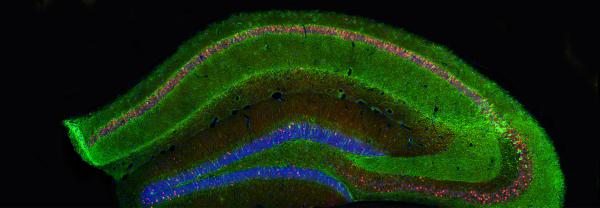

Professor Garry Myers, Director, Australian institute for Microbiology and Infection (AIMI), UTS
Professor Garry Myers leads the mRNA Vaccine research theme at the Australian Institute for Microbiology and Infection (AIMI) at UTS. Garry’s team focuses on informatics approaches to analyse genomes, transcriptomes, and proteomes in understanding host pathogen relationships. The overarching objective of the group’s research is identification of molecular markers that can be exploited to develop mRNA vaccines and diagnostic tools to reduce the use of antibiotics and the burden of antimicrobial resistance (AMR).

Associate Professor Iain Duggin, Deputy Director, Australian institute for Microbiology and Infection (AIMI), UTS
Associate Professor Iain Duggin leads the Microbial Morphology and Development (MMD) research theme at the Australian Institute for Microbiology and Infection (AIMI) at UTS. Iain’s research aims to understand cell division and shapeshifting in model archaea and bacteria, especially during changes in environmental conditions and develop ways to address the growing problems of climate change and infectious disease.

Professor Diane McDougald, Microbial Ecology and Evolution
Professor Diane McDougald leads the Microbial Ecology and Evolution group located theme at the Australian Institute for Microbiology and Infection (AIMI) at UTS. Prof McDougald has made significant contributions to the fields of Vibrio biology, bacterial adaptation to stress and mechanisms of molecular control of these responses, cell-to-cell communication, biofilm formation and interactions of bacteria with higher eukaryotes.

Distinguished Professor Steve Djordjevic, Infectious Diseases Group Leader
Professor Steven Djordjevic’s research focuses on bacterial pathogen evolution and emerging lineages. His team analyses genomic data to understand lateral gene transfer and antimicrobial resistance (AMR) from a One Health perspective. They also use proteomics to identify novel vaccine antigens. The group studies bacterial molecules involved in adherence, colonisation, and invasion of eukaryotic cells, with a special interest in protein processing and multifunctionality in pathogenesis.

Associate Professor Louise Cole, Director and Facility Manager of the Microbial Imaging Facility (MIF)
Associate Professor Cole has three decades of experience working with microscope methods that facilitate research with impact. She is passionate about training the next generation of imaging scientists and co-supervises Honours and PhD students. The MIF is an open-access core facility that provides advanced microscopy and image analysis platforms, expert training and support, and advice on specimen preparation for microbiological, biological, and biomedical samples.

Associate Professor Cindy Gunwan, UTS Chancellor’s Research Fellow
Associate Professor Cindy Gunawan leads the Biofunctional Nanomaterials ResearchGroup theme at the Australian Institute for Microbiology and Infection (AIMI) at UTS. The research team focuses on multi- targeting antimicrobials, to understand how they work and in turn, how pathogens develop resistance to the complex mechanisms. With the rapid rise of antibiotic resistance, advanced antimicrobials, such as nanoparticles, have been used as alternative technologies to fight infections.

Dr Mathieu Fourment, Data scientist
Dr Mathieu Fourment is a data scientist at the Australian Institute for Microbiology and Infection (AIMI) at UTS with an interest in understanding the evolutionary processes that drive the evolution of pathogens. He develops phylogenetic algorithms and software to investigate natural selection, evolutionary rates and the geographic dispersal of viruses such as influenza virus and HIV. His research is part of a bigger picture looking at ways to better manage global issues such as antimicrobial resistance and infectious disease outbreaks.

Dr Piklu Roy Chowdhury, Postdoctoral Research Fellow
Dr Piklu Roy Chowdhury (nee: Piklu Bhattacharya) is a senior research associate theme at the Australian Institute for Microbiology and Infection (AIMI) at UTS. Expert in both clinical and molecular microbiology, she tackles complicated problems in public health epidemiology and the emergence of various drug-resistant pathogens using multi-omics approaches. Her research is primarily aimed at generating a comprehensive understanding of infection mechanisms and host responses, with the overarching objective of developing diagnostic and preventative tools.

Dr Amy Bottomley, Imaging Scientist, Microbial Imaging Facility (MIF)
Dr Amy Bottomley, in her role within the MIF, contributes microscopy expertise to facilitate cutting-edge biological and biomedical research applications for all researchers at UTS wishing to use these technologies. She provides hands-on training and ongoing support across advanced optical imaging platforms within the facility, covering experimental design, sample preparation, image acquisition, and image analysis. Her main areas of focus are imaging of microbes and super-resolution microscopy. Amy can co-supervise Honours and PhD students.

Dr Bill Söderström, ARC Future Fellow and Senior Lecturer
Dr Bill Söderström has an extensive expertise in super-resolution microscopy and infection models. Bill is the Theme lead for the Imaging Microbes in Human Health, Disease & Death theme, where his two main foci are to improve infection models (both in-vitro and mouse) with the goal of developing mRNA vaccines for urinary tract infections, and to develop forensic microbiology for an Australian context, particularly improving time since death estimations based on the post-mortem microbiome.

Dr Yan Liao, Chancellor’s Research Fellow
Dr Yan Liao is a Chancellor’s Research Fellow and leads a research group on Archaeal Cell Biology and Biotechnology at the Australian Institute for Microbiology and Infection (AIMI) at UTS. She has extensive expertise in archaeal genetics, advanced imaging, biochemistry, and omics technologies. Her team focuses on deciphering the principles of cell division and growth in Archaea, a distinct domain of life, and developing archaeal cells for biomedical applications and environmental biotechnology.

Dr Mehrad Hamidian, Senior Lecturer
Dr Mehrad Hamidian is specialised in microbiology and genomics. His research focuses on studying antibiotic resistance and genomic evolution of the opportunistic pathogen Acinetobacter baumannii, which has recently been placed as number 1 in the list of World Health Organization for development of antibiotic research. He is particularly interested in studying clonality as well as the role of mobile genetic elements (e.g., plasmids insertion sequences, transposons, integrons and genomic islands) in development and spread of antibiotic resistance in this important superbug.

Dr Daniel Mediati, Chancellor’s Research Fellow & Lecturer
Dr Daniel Mediati is a Junior Group Leader within the themes of microbial development and RNA therapeutics at the Australian Institute for Microbiology and Infection (AIMI) at UTS. His team aims to discover new microbial mechanisms for therapeutic and biotechnological applications.

Dr Gustavo Espinoza, Research Associate, ARC DECRA Fellow
Dr Gustavo Espinoza leads the Single Cell Transcriptomics in Bacteria Lab theme at the Australian Institute for Microbiology and Infection (AIMI) at UTS. His laboratory uses cutting-edge techniques in molecular biology to study how infectious bacteria are transported from the environment to the host. His current research is focused on the host-impact of bacteria transported in novel transmission vectors.

Dr Parisa Noorian, Research Fellow
Dr Parisa Noorian is a research fellow theme at the Australian Institute for Microbiology and Infection (AIMI) at UTS. Her research focuses on prevention and treatment of urinary tract infections. Her current projects include a multicentre clinical trial on catheter associated urinary tract infections (CAUTI) in people with spinal cord injury (SCI) and a multi-institute project on the development of mRNA vaccines for recurrent UTIs.

Dr Veronica Jarocki, Research Fellow
Dr Veronica Jarocki is a CRC SAAFE Foundational Postdoctoral Fellow at the Australian Institute for Microbiology and Infection (AIMI) at UTS. Her research focuses on genomic surveillance of antimicrobial resistance (AMR) across human, animal, and environmental systems. Her work applies a One Health approach to understand AMR dissemination, pathogen evolution, develop vaccines, and inform public health and agricultural interventions. She can supervise PhD and Honours students.

Dr Tim Williams, Senior Research Assistant
Dr Tim Williams has extensive experience in environmental microbiology, especially microbial metabolism and physiology. Tim combines culture-independent and culture-dependent methods to investigate unusual and novel microorganisms from diverse habitats. Culture-independent methods include genomic analysis, metagenomics, and metaproteomics. Culture-dependent methods include the cultivation of bacteria and archaea in the laboratory, using different growth conditions.

Dr Dalong Hu, Bioinformatics Engineer
Dr Dalong Hu specialises in microbiology, epidemiology and bioinformatics for clinical pathogens detection, infectious diseases diagnosis/tracing/prevention and intestinal bacteria with their effect on health. He’s working on mRNA medicine design algorithm using AI. His highlighted works include revealing the origin of the 7th cholera pandemic and prognostic factors in elderly COVID-19 patients.

Dr Claire Rennie, Postdoctoral Research Fellow
Dr Claire Rennie is early-career researcher specialising in the field of neuro-nanomedicine at the Australian Institute for Microbiology and Infection (AIMI) at UTS. Her current research focuses on the pre-clinical evaluation of unique protein nanocages that have been engineered for the treatment of neurodegenerative diseases, primarily Alzheimer’s Disease.

Dr Hannah Brown, Postdoctoral Research Associate
Dr Hannah Brown is a postdoctoral researcher in Associate Professor Iain Duggin’s group, where she also completed her honours and doctoral degrees. Hannah’s research centres around the evolution of cytoskeletons across the tree of life. She investigates the functions of cytoskeletal proteins in diverse species of archaea, including salt-loving Haloarchaea and Asgard archaea, the closest living ancestors of Eukaryotes.

Xiaorong Liu, PhD student
Xiaorong Liu is a PhD student specialising in microbiology, nanomaterial engineering, and cellular biology. The research focuses on understanding the evolutionary adaptation, genetic mutations, and defense mechanisms of Staphylococcus aureus and Pseudomonas aeruginosa biofilms, both as single-species and mixed-species, under long-term exposure to nanosilver (NAg).

Matthew Pittorino, PhD Student
Matthew Pittorino is a PhD student in the Microbial Morphology and Development team supervised by Associate Professor Iain Duggin. Matthew specialises in molecular biology and super resolution microscopy, using these approaches to characterise the synergism between cell wall remodelling proteins during bacterial cell division.

Saleh Almusabi, PhD student
Saleh Almusabi is a PhD student specialising in microbiology and genomic epidemiology. His research focuses on tracing antibiotic resistance genes and mobile genetic elements carried by extraintestinal pathogenic Escherichia coli (ExPEC) in different microbial communities to support the One Health approach for the genomic surveillance of AMR.

Ophelia Phraphone, PhD Student
Ophelia Phraphone is currently completing a PhD project under the supervision of Dr Steven Djordjevic and Dr Veronica Jarocki, in collaboration with SAAFE CRC and Sydney Water. Her work focuses on the genomic surveillance of E. coli in Sydney wastewater treatment plants, aiming to gain insight into the evolution of resistance gene carriage and how the phylogeny of E. coli is affected by different treatment processes.

Amna Zafar, Phd student
Amna Zafar is specialising in nanoscience and microbiology, with a dedicated focus on antimicrobials. Her ongoing research is to investigate the mechanisms by which nanosilver interacts with and disrupts both single and mixed-species biofilms at molecular level.

Eradah Abusabah, PhD student
Eradah Abusabah is a PhD student focusing on microbiology and genomics, particularly antibiotic resistance. Her research explores the genomic evolution and resistance mechanisms of Acinetobacter baumannii, a critical bacterium identified by the World Health Organization. With a background in Medical Biotechnology and Microbiology, Eradah is investigating how mobile genetic elements contribute to the spread of antibiotic resistance.
For general enquiries, please contact AIMI administration: aimi@uts.edu.au

